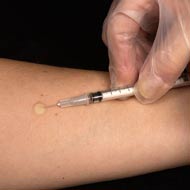
New report urges the Mayor of London to take action
Parts of London have significantly higher TB rates than countries in the developing world, according to a new report by the London Assembly Health Committee.
Released this week, the report shows there were more than 2,500 new TB cases in the capital last year. This accounts for nearly 40 per cent of all cases in England.
Some boroughs have TB rates as high as 113 in every 100,000 people, which is far higher than countries including Algeria, Rwanda, Iraq and Guatemala.
The report found that TB services are not equally accessible to all Londoners. For example, vaccination of newborn babies is not available in all boroughs, despite being recommended practice.
TB is caused by the bacterium Mycobacterium tuberculosis and is a particular risk to prisoners, homeless people and those with substance abuse issues.
Boris Johnson, the Mayor of London, is being urged to lead the way in driving better measures of prevention and treatment in the capital. Recommendations include taking steps to educate the public more widely about this disease.
A recent survey commissioned by the London Assembly found that one in five Londoners did not know the symptoms of TB when given a list. The findings also confirm that the disease continues to be heavily stigmatised.
The report also calls for health services to standardise the control and management of TB across London. NHS London was urged to set out plans for ensuring BCG coverage across the city's boroughs by 2017.
Committee chair Onkar Sahota said: "The Mayor needs to take more responsibility for TB control in London. He is uniquely placed to drive forward measures for TB prevention, as well as better access to treatment.
"If we don't get a grip on London's TB situation now, the harder and more expensive it will be to tackle in the years to come. With pressures on health budgets, we can't afford to take our eye off the ball."
For the full report, see: https://www.london.gov.uk/sites/default/files/FINAL_TacklingTBinLondon_0.pdf
Image (c) Centers for Disease Control and Prevention's Public Health Image Library (PHIL)



 The Veterinary Medicines Directorate (VMD) is inviting applications from veterinary students to attend a one-week extramural studies (EMS) placement in July 2026.
The Veterinary Medicines Directorate (VMD) is inviting applications from veterinary students to attend a one-week extramural studies (EMS) placement in July 2026.